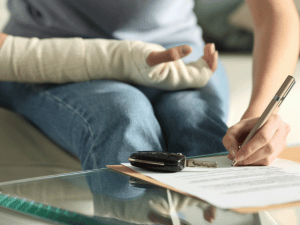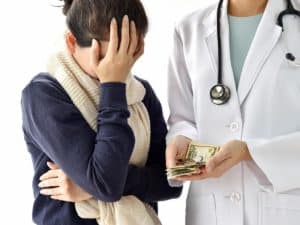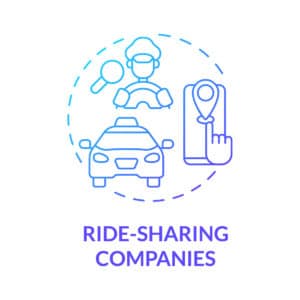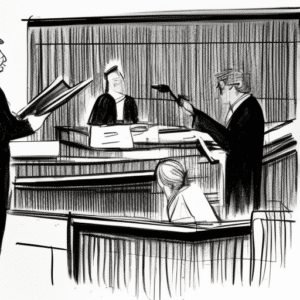Who is Responsible for Your Bills After a Ridesharing Accident?

Who is Responsible for Your Bills After a Ridesharing Accident
Who is Responsible for Your Bills After a Ridesharing Accident – More and more people are using ridesharing services like Uber and Lyft to get around. These services are a cheap and easy way to travel, but sometimes accidents happen. If an accident happens, people want to know who will pay for their bills. It can be hard to figure out who is responsible for paying, but we will explain the different factors that can make a difference. Sometimes the ridesharing company and driver will have to pay, but other times other drivers might have to share the responsibility. It's important to know your rights and options when something like this happens.
Ridesharing Accident Liability In General
After a ridesharing accident, who pays for your medical bills depends on who caused the accident and the insurance they have. Liability is a big deal when it comes to ridesharing accidents because it can be hard to figure out who is responsible for what. There are three main groups that might have to pay for your bills: the ridesharing company, the rideshare driver, and other drivers who were involved. It can be different in each state, and it depends on what happened in the accident.
Rideshare Driver Liability (Driver At Fault)

Rideshare Accident Victim Facing Medical Bills
Rideshare drivers in California are considered independent contractors as of February 2023. Therefore, drivers are responsible for carrying their own personal insurance coverage. If a rideshare driver causes an accident while on the job, their own insurance policy may provide coverage for the damages.
However, it's important to note that personal insurance policies may not provide coverage while the driver is using their vehicle for commercial purposes, such as ridesharing. This means that the driver's personal insurance may not cover the damages in the event of an accident while they are driving for Uber or Lyft. In such cases, the driver may need to rely on the insurance provided by the ridesharing company.
Ridesharing Company Liability (Driver At Fault)
Ridesharing companies such as Uber and Lyft can be held liable for accidents caused by their drivers under the legal theory of “respondeat superior.” This is a Latin term that means “let the master answer” and is a legal principle that holds employers responsible for the actions of their employees when those actions occur within the scope of their employment.
In the case of ridesharing companies, this means that if a rideshare driver causes an accident while on the job, the company may be held liable for the resulting damages and injuries. This is because the driver is acting as an agent of the company and is providing a service on behalf of the company.
Under the legal theory of respondeat superior, the ridesharing company may be held liable for the driver's negligent actions, even if the company itself was not directly involved in the accident. This can include liability for medical bills, lost wages, and other damages incurred by the driver, passengers, or other parties involved in the accident.
Amount of Coverage Carried By Rideshares Like Uber/Lyft
Ridesharing companies are required to carry liability insurance to cover accidents involving their drivers. Uber and Lyft both provide $1 million in liability insurance in California to cover bodily injury and property damage. If a ridesharing driver causes an accident while on the job, the company's insurance will generally cover the damages.
However, it's important to note that the insurance coverage provided by ridesharing companies may vary depending on the circumstances of the accident. For example, if the ridesharing driver was not on duty at the time of the accident, the company's insurance may not cover the damages. Additionally, there may be limits to the coverage provided by the insurance policy. In some cases, the driver or other parties may need to seek compensation from the driver's personal insurance policy or pursue legal action to cover the remaining damages.
Other Involved Drivers (Other Drivers At Fault)

For example, let's say that you are a passenger in an Uber, and the Uber driver collides with another car at an intersection. If the other driver ran a red light or failed to yield the right of way, they may be found at fault for the accident. In such a case, the injured party, whether it is the Uber driver or a passenger, may pursue a claim against the at-fault driver's insurance policy.
Similarly, if a rideshare driver is hit by another driver who is under the influence of drugs or alcohol, the impaired driver may be found at fault for the accident. In this case, the injured party may pursue a claim against the at-fault driver's insurance policy to cover their medical bills and other damages.
In some cases, liability may be shared among multiple parties. For example, if the rideshare driver was speeding and the other driver ran a red light, both parties may be found at fault for the accident. In such cases, the injured party may need to pursue claims against both drivers' insurance policies to cover their medical bills and other damages.
It's important to note that liability and insurance coverage can vary depending on the specific circumstances of the accident and the state where it occurred. Consulting with an experienced personal injury attorney can help you understand your legal rights and options in such situations.
A Note For Rideshare Drivers and California Workers' Compensation Coverage

Ridesharing Companies
Who is Responsible for Your Bills After a Ridesharing Accident For an at-fault Rideshare Driver
In the event that a rideshare driver causes an accident while working, they may not be able to rely on workers' compensation insurance to cover their bills. This is because workers' compensation insurance is designed to cover employees who are injured on the job, and rideshare drivers are typically classified as independent contractors, not employees.
As ridesharing continues to grow in popularity, there has been a push to extend workers' compensation coverage to rideshare drivers. Some states, such as California, have passed laws that require ridesharing companies to provide workers' compensation insurance to their drivers. However, these laws may not apply in all states, and there is still ongoing debate about the classification of rideshare drivers as employees or independent contractors.
In summary, rideshare drivers who cause an accident while working may not be able to rely on workers' compensation insurance to cover their bills. Instead, they may need to rely on personal auto insurance, the insurance provided by the ridesharing company, or pursue legal action to recover damages from other parties involved in the accident.
FEBRUARY 23, 2023 COURT CASE UPDATE:
Recently, an Alameda Superior Court Judge found that Proposition 22 is unconstitutional. If the judges decision is affirmed on appeal, then rideshare drivers will be classified as employees entitled to workers' compensation insurance coverage. However, the current law as of the writing of this blog is that rideshare drivers are independent contractors who are not entitled to workers' compensation. This means that if the rideshare driver causes the incident, there is no coverage for the driver.
The Best Rideshare Attorneys Help Recover Money Compensation For Medical Bills

Argue A Rideshare Lawsuit in Court
By understanding the potential risks and liabilities involved in ridesharing accidents, you can make informed decisions and take the necessary steps to protect yourself and your rights.
If you are involved in a ridesharing accident, take the necessary steps to protect yourself and your rights. Seek medical attention immediately and report the accident to the ridesharing company. Collect as much evidence as possible, and consult with an experienced personal injury attorney to understand your legal options. Finally, know your rights about who is Responsible for Your Bills After a Ridesharing Accident.
#ridesharing #Uber #Lyft #accident #liability #insurance #personalinjury #attorney #medicalattention #evidence #legalrights #safety #compensation #injured #caraccident #rideshare
- Safely and Legally Navigating Parking Lots in California - July 15, 2024
- Navigating the Aftermath of a Highway Auto Accident in California - July 15, 2024
- An Overview of California's Commercial Truck Insurance Laws - July 15, 2024
